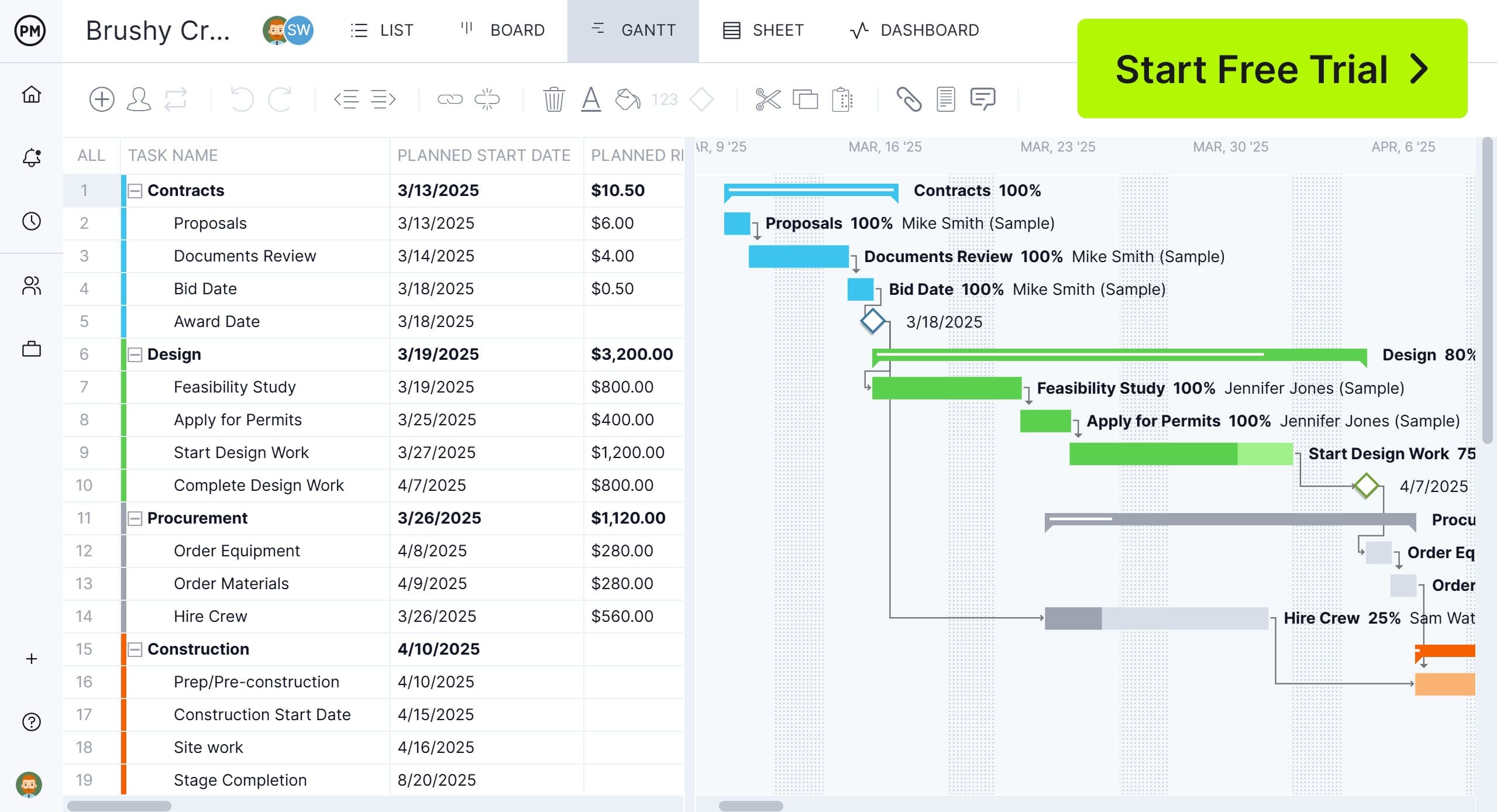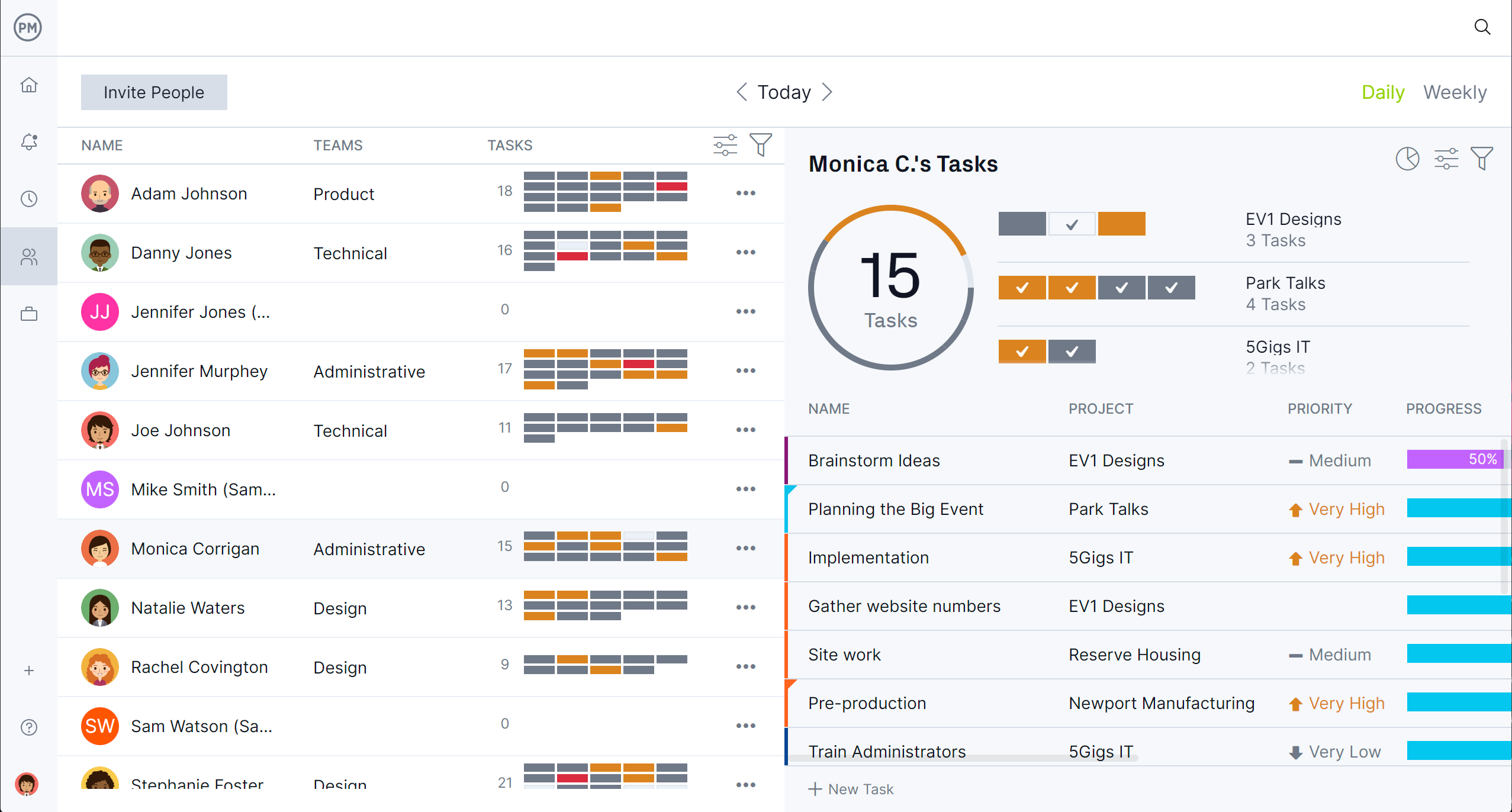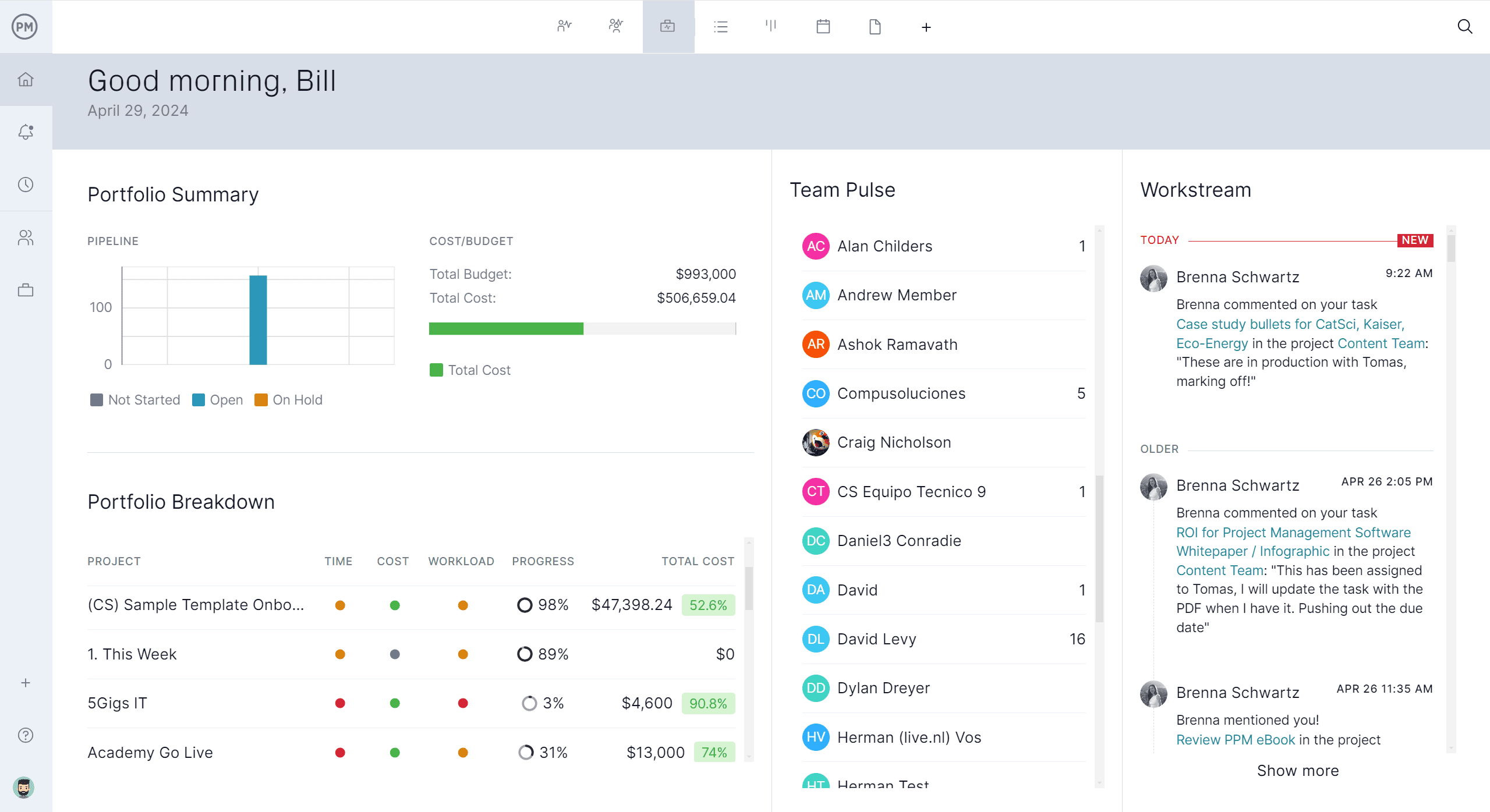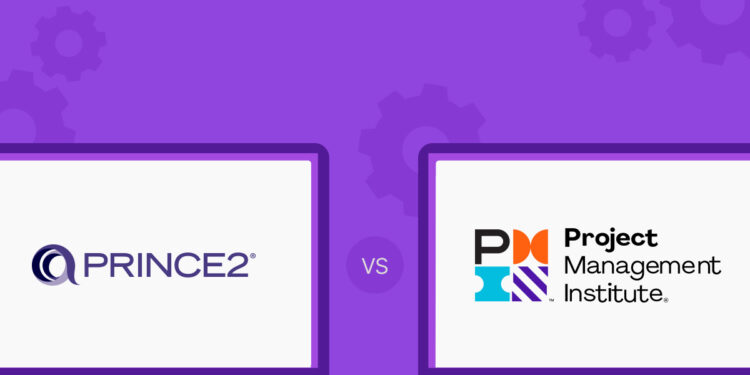Before comparing PRINCE2 vs. PMP, it’s important to understand that though they’re often mentioned in the same context within project management, they serve different purposes. PRINCE2 (Projects IN Controlled Environments) is a project management framework.
That is, it’s a structured approach with defined principles, themes and processes. It focuses on governance, organization and clearly defined roles and responsibilities. While PMP (Project Management Professional) is a certification that validates a project manager’s experience.
What Is the PMP Certification?
PMP certification is a globally recognized credential awarded by the Project Management Institute (PMI). It validates a project manager’s ability to lead and manage projects effectively, using best practices and methodologies established in the Project Management Body of Knowledge (PMBOK Guide).
The PMP certification is widely respected across industries, including IT, construction, healthcare, finance and manufacturing. It demonstrates a project manager’s competence in handling various aspects of project management, including planning, executing, monitoring and closing projects.
Project management professionals obtain PMP certification to enhance their credibility and marketability as skilled project managers. It increases opportunities for career advancement and higher salary potential by giving those who get it a comprehensive knowledge of project management principles and global recognition (the certification is recognized in over 200 countries).
Having a PMP certification is only the starting point. To apply that knowledge, project managers need project management software. ProjectManager is award-winning project and portfolio management software with robust Gantt charts that can schedule tasks, resources and costs. More than that, it can link all four types of task dependencies to avoid cost overruns, filter for the critical path to identify essential tasks and slack, then set a baseline to track actual progress in real time. Get started with ProjectManager today for free.


When to Choose the PMP Certification
The PMP certification is ideal for professionals managing projects across industries who need a globally recognized credential. It’s best suited for those with hands-on experience leading projects and applying diverse methodologies, including predictive, agile and hybrid approaches. PMP is widely accepted in North America, Asia and the Middle East, making it valuable for international opportunities.
It emphasizes project execution, leadership and strategic thinking, making it beneficial for senior project managers and those seeking career advancement. If you work in dynamic environments where adaptability and stakeholder engagement are crucial, PMP provides the frameworks and best practices to succeed.
Comparison: PMP vs. PRINCE2 Certifications
PMP vs. PRINCE2 certifications are both prestigious in the project management field, but they serve different purposes. While PMP focuses on applying project management best practices, PRINCE2 provides a structured framework for project governance and control.
PRINCE2 emphasizes governance, with well-defined processes, roles and responsibilities to ensure project alignment with business goals. In contrast, PMP is centered on execution and offers flexibility in managing projects using different methodologies, including agile, waterfall and hybrid approaches.
Certification structures also differ. PRINCE2 has two levels: Foundation for understanding the framework and Practitioner for applying it in real-world scenarios. PMP is a single-level certification demonstrating comprehensive knowledge of project management principles and practices.
In terms of industry recognition, PMP is globally respected, especially in North America and Asia. PRINCE2 is most widely adopted in the UK, Europe and Australia, particularly for government and public sector projects.
The exam formats reflect their focus. PMP’s test includes 180 questions over 230 minutes, assessing project management knowledge across people, process and business domains. PRINCE2’s Foundation exam has 60 multiple-choice questions focusing on theoretical understanding, while the Practitioner exam involves scenario-based questions that test practical application.
Prerequisites also vary. PMP requires extensive project management experience and formal training, whereas PRINCE2 Foundation has no prerequisites, making it accessible to beginners. However, the Practitioner level requires a Foundation certification or a relevant project management qualification.
Choosing between PMP and PRINCE2 depends on your career goals. If you seek a certification that validates your practical project management skills across industries, PMP is ideal. On the other hand, if you work in a highly regulated environment that values structured governance, PRINCE2 may be a better fit. Some professionals pursue both to diversify their credentials and maximize their career potential.
PMP vs. PRINCE2 Practitioner
The PRINCE2 Practitioner certification is designed for project managers and professionals who want to apply the PRINCE2 framework in real-world projects. Building on the foundational knowledge from the PRINCE2 Foundation level, it focuses on how to tailor and implement the principles, themes and processes to manage projects effectively. It’s best suited for experienced professionals responsible for project delivery, particularly in environments that require structured governance.
The certification involves a scenario-based exam with 68 objective questions to be completed in 150 minutes. It tests the ability to apply PRINCE2 concepts to practical situations. Certification is valid for three years and can be renewed through continuous learning or retaking the exam. While PRINCE2 is traditionally applied in predictive, waterfall-style projects, it can also be adapted for agile teams by incorporating iterative planning and flexible workflows within its structured framework.
PMP vs. PRINCE2 Foundation
The PRINCE2 Foundation certification introduces professionals to the PRINCE2 framework, which emphasizes a structured, process-driven approach to project management. It focuses on the principles, themes and processes that ensure projects remain well-governed and aligned with business objectives. This certification is ideal for those looking to understand the fundamentals of project management in a controlled environment.
The Foundation level is suitable for beginners or team members seeking a solid understanding of project management terminology and concepts. There are no certification prerequisites, making it an accessible starting point for anyone interested in project management.
The exam is scenario-based multiple choice, focusing on theoretical knowledge. Upon passing, the certification remains valid for three years, with the option to renew through continued professional development. While PRINCE2 is traditionally associated with predictive, waterfall projects, its principles can be applied in agile environments by incorporating flexible delivery methods and iterative progress monitoring.
PMP vs. PRINCE2 Agile Foundation
The PRINCE2 Agile Foundation certification combines the best of PRINCE2’s structured approach with the flexibility of agile methodologies. This certification focuses on how to integrate agile principles and techniques into the PRINCE2 framework, enabling project managers to tailor project delivery to be more adaptable and iterative while maintaining governance and control. It’s ideal for professionals working in environments where both structured management and agile flexibility are required.
PRINCE2 Agile is valuable for organizations that require agility within a controlled project management environment. The certification is suited for project managers, team leaders and professionals in agile project settings, particularly where project scope or requirements evolve frequently.
The exam consists of 50 multiple-choice questions, and candidates must achieve a passing score within one hour. There are no strict prerequisites, although a basic understanding of project management principles is recommended. Once certified, the credential is valid for three years, after which it can be renewed through continued professional development.
This certification is ideal for agile teams, as it helps integrate agile methods with PRINCE2’s structured framework, providing a practical and scalable approach for managing agile projects while ensuring control, quality and focus on delivering business value.
PMP vs. PRINCE2 Agile Practitioner
The PRINCE2 Agile Practitioner certification is designed for project managers and professionals who want to apply the PRINCE2 framework in agile environments. It focuses on how to effectively tailor and implement PRINCE2 principles, themes and processes while incorporating agile practices like scrum, kanban and lean. The certification equips professionals to manage projects that require both structure and flexibility.
PRINCE2 Agile Practitioner is ideal for experienced project managers, agile team leaders and those responsible for managing complex projects with changing requirements. To qualify, candidates must have completed PRINCE2 Agile Foundation or hold other relevant certifications, such as PRINCE2 Foundation, PMP, or Certified ScrumMaster (CSM).
The exam consists of 50 scenario-based questions to be completed in 2.5 hours, assessing the candidate’s ability to apply agile concepts within the PRINCE2 framework. Upon passing, the certification remains valid for three years and can be renewed through continuous learning or retaking the exam.
PRINCE2 Agile Practitioner is particularly well-suited for agile teams. It provides practical guidance on balancing agile flexibility with structured project governance, ensuring projects remain aligned with business goals while delivering incremental value through agile iterations.
PMP vs. MSP (Managing Successful Programmes) Foundation
The MSP Foundation certification introduces professionals to the principles and framework of Managing Successful Programmes (MSP), which is designed to manage and coordinate multiple related projects within a program. The focus is on delivering strategic business outcomes and managing organizational change effectively. It is particularly useful for organizations undergoing large-scale transformations or complex initiatives.
MSP Foundation provides a structured approach to program management, emphasizing governance, stakeholder engagement and aligning projects with broader business goals. It is widely recognized in industries where managing interconnected projects is essential, especially in the public sector and large enterprises. The certification is suitable for program managers, senior project managers and those involved in delivering strategic initiatives.
Although PRINCE2 is another project management framework that focuses on the management and control of individual projects, MSP operates at a higher level, ensuring projects within a program align with long-term business strategies. While PRINCE2 supports effective project delivery, MSP Foundation ensures that the collective outcomes of multiple projects deliver sustainable benefits.
PMP vs. MSP (Managing Successful Programmes) Practitioner
The MSP Practitioner certification builds on the foundational knowledge of the MSP framework, focusing on the practical application of program management principles. It equips professionals to manage complex, large-scale programs that involve multiple interrelated projects, ensuring they deliver long-term business benefits.
Designed for experienced program managers, senior project managers and business leaders, MSP Practitioner provides guidance on implementing governance structures, managing stakeholders and aligning program objectives with organizational strategy. The certification is globally recognized and especially valuable in industries undergoing significant transformations.
While certifications like PRINCE2 focus on managing individual projects, MSP Practitioner is ideal for those overseeing multiple projects within a program, ensuring strategic goals are met effectively.
PMP vs. Management of Portfolios (MoP) Foundation
The MoP Foundation certification provides a comprehensive understanding of how to manage an organization’s portfolio of projects and programs to achieve strategic goals. It focuses on prioritizing investments, ensuring resources are used effectively and delivering the greatest value. MoP emphasizes governance and decision-making to balance project risks, benefits and resource demands.
It is best suited for senior executives, portfolio managers and decision-makers responsible for aligning projects and programs with organizational strategy. Recognized globally, the certification is valuable in the public and private sectors where organizations manage complex portfolios.
In contrast, PRINCE2 is a project management framework focused on delivering and controlling individual projects. While PRINCE2 is ideal for project managers handling day-to-day execution, MoP provides a higher-level perspective for those overseeing multiple projects to ensure they collectively achieve strategic objectives.
PMP vs. Management of Portfolios (MoP) Practitioner
The MoP Practitioner certification builds on the knowledge gained at the Foundation level, focusing on the practical application of portfolio management principles. It equips professionals to apply the Management of Portfolios (MoP) framework in real-world scenarios, ensuring an organization’s projects and programs are aligned with its strategic objectives.
This certification is best for portfolio managers, senior executives and decision-makers responsible for prioritizing investments, managing risks and optimizing resource use. By applying MoP principles, certified practitioners contribute to delivering maximum value from an organization’s project portfolio.
While PRINCE2 manages individual projects and MSP oversees programs, MoP Practitioner ensures that all projects and programs collectively drive the organization’s long-term goals.
PMP vs. Management of Risk Foundation
The MoR Foundation certification provides a solid understanding of the Management of Risk (MoR) framework, which focuses on identifying, assessing and managing risks across an organization. It covers principles, processes and techniques to minimize threats and maximize opportunities in project and operational environments.
MoR Foundation is ideal for risk managers, project managers, business analysts and decision-makers who need to apply structured risk management practices. It is widely recognized across industries and provides a comprehensive approach to managing uncertainty at strategic, program, project and operational levels.
While certifications like PRINCE2 focus on project management, MoR ensures that potential risks are proactively managed, contributing to informed decision-making and improved organizational resilience.
PMP vs. Management of Risk (MoR) Practitioner
The MoR Practitioner certification builds on the foundational knowledge of risk management and focuses on the practical application of the Management of Risk (MoR) framework. It enables professionals to apply risk management principles effectively across projects, programs and organizational operations to address potential risks and optimize opportunities.
This certification is ideal for risk managers, project managers and senior executives who manage risks at an operational and strategic level. It emphasizes integrating risk management into decision-making processes and aligning it with organizational objectives.
While the MoR Foundation provides the foundational knowledge, the Practitioner level focuses on applying this knowledge to real-world scenarios, ensuring that risks are managed proactively and comprehensively across an organization.
How ProjectManager Can Help PMP and PRINCE2 Project Management Professionals
PMP vs. PRINCE2 doesn’t matter when you’re tasked with delivering a project. What’s important is that you can plan, manage and track work to get it completed on time and within budget. Regardless of the certification, you’ll find project management professionals using project management software. It’s simply more efficient and effective.
ProjectManager is award-winning project and portfolio management software that is flexible enough to work with any methodology or approach to project management. Our multiple project views allow users to have the tools they want, from Gantt charts for waterfall to kanban boards for agile and task lists, calendar views and more.
Stay Productive With Resource Management Features
Human and nonhuman resources are scheduled on Gantt charts and then, when teams are onboarded, their availability can be set to streamline the assigning of tasks. That means that the right resource is assigned to the right task at the right time, which keeps the project moving forward as planned.
To view resource allocation across one or multiple projects, visit the color-coded workload chart. It makes it easy to see who is overallocated or underutilized and balances the team’s workload to keep everyone working at capacity without threatening burnout. The team page shows their activity on a daily or weekly basis and can be filtered by priority or progress. Tasks can even be updated without leaving the page.


Monitor Cost, Progress and More on Real-Time Dashboards and Reports
PMP vs. PRINCE2 doesn’t change that projects have to be delivered on time and within budget, meeting quality standards. Get a high-level overview of project metrics on our real-time project or portfolio dashboards. The easy-to-read graphs and charts display time, cost, workload and more.
To get into the weeds, use the customizable reports on status, variance, timesheets, workload and more. They can be filtered to show key data points or a more general summary of progress that can be shared with stakeholders. Even our secure timesheets help by tracking labor costs to help projects stay on budget.


Related Content
PRINCE2 vs. PMP is a small, albeit important, part of project management. For readers who are interested in reading more about the subject, below are a handful of links that explore certifications, go deeper into PRINCE2 and more.
ProjectManager is online project and portfolio management software that connects teams whether they’re in the office or out in the field. They can share files, comment at the task level and stay updated with email and in-app notifications. Join teams at Avis, Nestle and Siemens who use our software to deliver successful projects. Get started with ProjectManager today for free.







